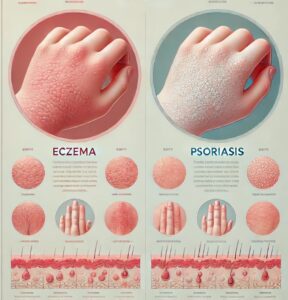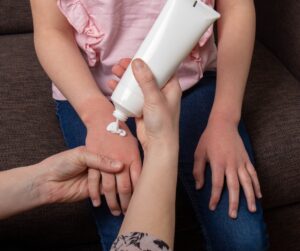Eczema, medically known as atopic dermatitis, is a chronic skin condition that causes itching, redness, and discomfort. It is most commonly seen in children, but many wonder: Will eczema naturally improve as a child grows older? This article explores the likelihood of eczema improving with age, factors influencing its progression, and effective management strategies to enhance skin health.
What is Eczema and Why Does It Occur?
Eczema is an inflammatory condition caused by a combination of genetic, environmental, and immunological factors. It often begins in infancy or early childhood and can range from mild to severe. Symptoms include:
- Persistent itching
- Red or inflamed skin
- Dryness and flaking
- Oozing or crusting during flare-ups
The condition is commonly associated with other atopic diseases like asthma or hay fever. Understanding the triggers and underlying causes is crucial for effective management.
Does Eczema Improve Over Time?
The question of whether eczema goes away with age depends on individual circumstances. Research shows that:
- Around 60-70% of children see significant improvement or complete resolution by their teenage years.
- Adults with eczema may experience symptoms intermittently, often triggered by stress or environmental factors.
Factors influencing whether eczema improves include:
- Genetic predisposition: A family history of eczema, asthma, or allergies increases the risk of persistent symptoms.
- Severity of the condition: Children with mild eczema are more likely to outgrow it compared to those with severe forms.
- Skin barrier health: Consistently maintaining a healthy skin barrier through moisturization can accelerate improvement.
- Exposure to irritants: Reducing contact with allergens, harsh chemicals, or environmental irritants supports better outcomes.
How to Manage Eczema at Any Age
While waiting for eczema to improve naturally, proactive management is essential to minimize flare-ups. Consider these tips:
- Moisturize Twice Daily
Use thick, fragrance-free emollients to lock in moisture and repair the skin barrier. - Identify and Avoid Triggers
Common triggers include pollen, pet dander, certain fabrics (like wool), and harsh soaps. Maintaining an allergy-friendly home environment helps reduce flare-ups. - Incorporate Anti-Inflammatory Foods
Diets rich in omega-3 fatty acids, like fish and flaxseeds, as well as vitamin E from leafy greens, promote healthy skin. - Consult a Dermatologist
Severe or persistent eczema may require prescription treatments like topical steroids, calcineurin inhibitors, or biologic therapies. - Practice Gentle Skin Care
Use lukewarm water for baths and pat the skin dry instead of rubbing it.
How Eczema Affects Adults
For individuals whose eczema persists into adulthood, it may appear on the hands, face, or neck. Adult eczema often has distinct triggers such as:
- Hormonal changes
- Stress or anxiety
- Seasonal weather fluctuations
Managing adult eczema often requires a multi-faceted approach, including stress management and targeted medical treatments.
Key Takeaways
Eczema tends to improve with age for most children, but not all cases resolve completely. The likelihood of natural improvement depends on genetics, severity, and lifestyle factors. Early and consistent management plays a vital role in minimizing symptoms and improving quality of life. Parents and adults should prioritize proactive care and seek professional guidance to address persistent cases.
By understanding eczema and implementing effective strategies, individuals can manage the condition confidently at every stage of life.
References
- Shah, R. S., et al. (2017). "Food Allergy and Atopic Dermatitis in Children: Epidemiological Trends." Journal of Allergy and Clinical Immunology, 140(2): 387-393.
- Lim, Y., et al. (2016). "Climate Change and Its Impact on Atopic Dermatitis in Children." International Journal of Dermatology, 55(6): 617-622.
- Silverberg, J. I., et al. (2014). "Pet Dander and Eczema in Children: A Review of the Literature." Pediatric Dermatology, 31(4): 425-431.
- Williams, H. C., et al. (2013). "Bacterial Infections and Atopic Dermatitis in Children: A Systematic Review." The Lancet, 381(9871): 614-623.
- Sampson, H. A., et al. (2015). "The Role of Stress in the Worsening of Eczema." Journal of Dermatological Science, 79(3): 237-243.
- National Eczema Association. (n.d.). "Understanding Eczema: Triggers and Long-Term Management Strategies." National Eczema Association.
- Mayo Clinic. (n.d.). "Eczema and Skin Barrier Repair Strategies." Mayo Clinic.
- DermNet New Zealand. (n.d.). "Triggers and Management of Eczema." DermNet New Zealand.
- Baldwin, A. R., et al. (2019). "Chemical Irritants and Atopic Dermatitis: A Review." British Journal of Dermatology, 180(3): 467-473.
- World Allergy Organization. (n.d.). "Allergy-Friendly Practices for Atopic Conditions." World Allergy Organization.
- WebMD. (n.d.). "Eczema-Friendly Diet Tips." WebMD.
- PubMed. (n.d.). "Therapies for Persistent Eczema." PubMed Database.
- National Eczema Society. (2020). "Biologics for Severe Eczema."
- American Academy of Dermatology. (2021). "Eczema Care: Bathing Tips." Retrieved from
- Silverberg, J. I. (2019). "Adult Eczema and Its Unique Challenges." Dermatologic Clinics, 37(1): 157-167.













